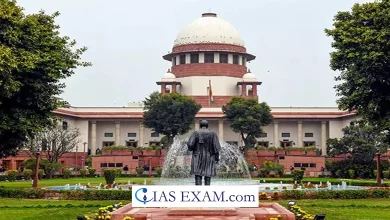Daily Current Affairs for UPSC
Strengthening Cooperative Movement in India
Syllabus- Indian Polity and Governance [GS Paper-2]

Context- A strategy to establish viable grass-roots societies in each uncovered Panchayat has been approved by the Union Cabinet for strengthening the country’s cooperative movement.
Key Highlights-
- The Association Bureau has supported an arrangement to lay out
-
- feasible Primary Agricultural Credit Societies (PACS) in each revealed Panchayat
- practical dairy cooperatives in each revealed Panchayat/town
- practical fishery cooperatives in each seaside Panchayat/town as well as Panchayat/town having huge water bodies.
- The arrangement plans to reinforce the current PACS/dairy/fishery cooperatives through assembly of different plans of Service of Fisheries, Creature Cultivation and Dairying by utilizing the ‘entire-of-Government’ approach.
- It expects to set up 2 lakh PACS/Dairy/Fishery cooperatives in the next five years with the assistance of an activity plan ready by NABARD, National Dairy Development Board (NDDB) and National Fishery Development Board (NFDB).
- A public helpful data set is likewise being ready by Service of Participation for ongoing checking of the new helpful social orders.
Importance :
- gives the farmers forward and in reverse linkages to showcase their produce, improve their pay, get credit offices and different administrations at town level itself.
- laying out new helpful social orders would create business amazing open doors in provincial regions, which would have multiplier impact for the country economy.
- empower farmers to acknowledge better costs for their items, grow the size of their business sectors and coordinate them into the production network.
Primary Agricultural Credit Societies (PACS)
-
- Primary Agricultural Credit Societies (PACS) act as the last connection in a three-level helpful credit structure headed by the State Cooperative Banks (SCB) at the state level.
- They give short and medium-term credit and other information administrations to part farmers.
- There are 98,995 PACS in the country with a part base of 13 crore,
- These are renegotiated by NABARD through 352 District Central Cooperative Banks (DCCBs) and 34 State Cooperative Banks (SCBs).
- Significances of PACS :
- give multi-useful administrations, for example, giving info supplies, showcasing and exchanging .
- Give in reverse linkages like warehousing administrations for better cost acknowledgment by farmers.
- Structures the center of credit framework for farmers.
- PACS represent 41% (3.01 crore farmers) of the Kisan Credit Card (KCC) advances given by all elements in the nation, and 95% of these KCC credits (2.95 crore farmers) through PACS are to little and peripheral farmers.
- Issues with PACS:
-
- PACS cover just around half of provincial families.
- Their assets are deficient to handle the short-and medium-term credit requirements of the provincial economy.
- Credit given by PACS is restricted in both scale and capability.
- Wasteful administration structure.
Way forward:
- Digitisation of PACS for better administration
- Smoothing out of administration structures for better control of assets.
- Presentation of expert administration with an expectation to foster them as All inclusive resources for addressing every one of the necessities of its individuals.
CO-OPERATIVE SOCIETIES
- It is an intentional relationship of people having normal necessities who hold hands for the accomplishment of normal financial interest.
- Its point is to serve the interest of the more unfortunate segments of society through the rule of self improvement and common assistance
Evolution Post Independence
- After autonomy, the designers of the Constitution set cooperatives in the State list. They came to be viewed as instruments of financial turn of events and turned into a fundamental focal point of the underlying Five-Year Plans
- In 1958, the National Development Council (NDC) had suggested a public strategy on cooperatives and setting up of Co-employable Promoting Social orders.
- National Cooperative Development Corporation (NCDC), a legal organization, was set up under the National Cooperative Development Corporation Act, 1962..
- States made their own regulations to manage cooperatives inside their locale, yet in 1984, the Multi-State Co-operative Societies Act was established by Parliament to merge various regulations at the focal level.
- In 2002, Legislature of India sanctioned the Multi-State Cooperative Societies Act 2002 to supplant the 1984 demonstration.
- The Legislature of India likewise declared a National Policy on Co-operatives in 2002.
- To unite the additions made in co-usable area ,Government changed the constitution by means of the 97th Constitutional Amendment Act 2011. The demonstration created following changes
- Expansion of another Part IX-B to the Constitution named “The Co-operative Societies” (Articles 243-ZH to 243-ZT).
- The option to shape helpful social orders was incorporated as Right to Freedom (Article 19 (1)).
- Advancement of Collaboration social orders was embedded as one of the DPSPs (Article 43-B).
- Development of a different ‘Ministry of Cooperation’ in 2021 for understanding the vision of ‘Sahakar se Samriddhi’ (Flourishing through Participation) and to give another push to the helpful development.
- To plug the “loopholes” in the MSCS Act, to further develop straightforwardness and simplicity of carrying on with work the public authority introduced a Bill looking to revise the 2002 demonstration.
- The Lok Sabha has as of late alluded the Multi-State Co-operative Societies (Amendment) Bill-2022 to a joint panel of Parliament in December 2022.
Significance of Cooperatives
- Cooperatives are established in the majority rules system and are adaptable which makes them appropriate for financial turn of events.
- It Imparts in individuals a feeling of balance, commonality, and co-activity.
- They work with a more fair conveyance of the advantages of the economy.
- Cooperatives give horticultural credit where state and confidential areas can’t reach.
Issues
- Endless Deferment of races: There have been cases where decisions have been deferred endlessly and designated office carriers or heads staying responsible for these foundations for quite a while.
- Diminished accountability:Trends like politicization of boards,irregular races have decreased the responsibility of the administration of co-usable social orders to their individuals.
- Amateurish way of behaving: Lacking impressive skill in administration in a large number of the co-usable foundations has prompted unfortunate administrations and low efficiency.
Changes
- Foreign Direct Investment (FDI): Permit Unfamiliar Direct Speculation (FDI) in the agreeable area, especially in Essential Rural Helpful Social orders (PACS) for expansion of assets and foundation.
- Innovation upgradation: Making of an innovation upgradation reserve for the area to refresh and further develop foundation.
- Utilizing Area accessible with PACS: PACS have more land than the Railways.It can be utilized for extending the asset base of agreeable social orders.
Way Forward
Co-agents need to run on deeply grounded popularity based standards. Hence, there is a need to start key changes to revive these establishments to guarantee their commitment in the monetary improvement of the nation and furthermore to guarantee their independence, vote based working and expert administration.





.png)



